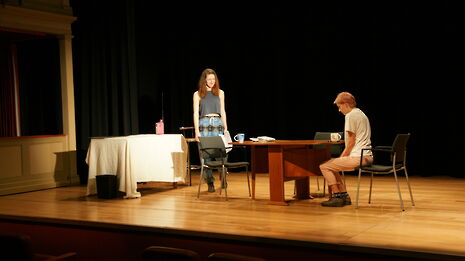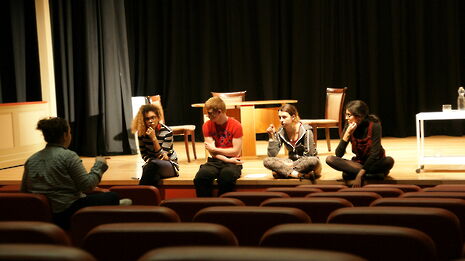A Festival of New Writing 2018 preview: ‘breaking the catch-22 of scriptwriting’
Downing Dramatic Society’s Festival of New Writing promises to be a space for writers to stage their works-in-progress and for the audience to be part of the creative scriptwriting process.

For a writer it is next to impossible to get new writing put on stage, unless people have already seen it. Meanwhile nobody is ever going to see your work if you can’t get it put on. The Festival of New Writing exists with the purpose of helping to break through this catch-22 of scriptwriting.
This week sees the return of the Downing Dramatic Society’s Festival of New Writing for its fourth consecutive year. Already established as a breeding ground for writing talent in Cambridge, the festival brings nine short plays to the stage for the first time.
It is very much in the spirit of the festival that these are works that are still in progress. We certainly aren’t looking for the polished final piece. Steven Bennett, TV scriptwriter and faithful associate of the festival, puts it that “these are all works in development; growing and changing with every rehearsal and note-session”. The intention is for the audience to be part of the creative script-writing process.
Three industry professionals will be in residence over the weekend, offering feedback to the writers at the end of each evening’s set of performances. This discussion will take place on the stage, so that the audience can engage in the process. We really hope that the writers will keep working on their pieces after leaving this experience. Advice from our panellists, along with the experience of putting their work on before a Cambridge crowd, should send them well on their way.

Alex Lass, alumnus of the Cambridge theatre scene and one of the panellists at this year’s festival, asks the writers to “come up with stories that subvert chronology and location”, adding that “single-place single time-frame stories may be the best suited to the practicalities of the theatre but they can also be deathly dull”. With the level of freedom that the festival offers to writers, the opportunity to mess about with time and spaces is something that is encouraged. Scripts have been changing throughout the rehearsal process, as the collaborative production process brings out new ideas and corrects awkward quirks.
As a committee, one of our favourite things about the festival is the variety offered to the audience each night. With three or four short plays put on in quick succession, we find ourselves transported from an afternoon brunch gone wrong one moment to a drama played out on a train. Despite the big variations in setting and subject matter, each play deals with relationships in its own way that we hope challenges and engages our audiences.
The Howard Theatre stage is left deliberately empty, leaving it largely to the actors to bring the writing to life. A solid store of props is available, but there will be no showy set-pieces. Breaking down barriers between stage and audience, the staging is designed to feel more like stepping into a rehearsal space than a night out on the West End.
For Alex Lass, the opportunity presented to writers isn’t to be underestimated. “Two of the biggest costs of making professional theatre are paying actors salaries and venue hire. Relish your time at a place where those costs are considerably less”. It is easy to forget, buried in the essay crises and reading lists, that Cambridge theatre does offer a unique opportunity for budding writers and actors to try things out.
A Festival of New Writing 2018 is on at the Howard Theatre, 8-10 March
 News / Uni Scout and Guide Club affirms trans inclusion 12 December 2025
News / Uni Scout and Guide Club affirms trans inclusion 12 December 2025 News / Pembroke to convert listed office building into accom9 December 2025
News / Pembroke to convert listed office building into accom9 December 2025 Features / Searching for community in queer Cambridge10 December 2025
Features / Searching for community in queer Cambridge10 December 2025 News / Uni redundancy consultation ‘falls short of legal duties’, unions say6 December 2025
News / Uni redundancy consultation ‘falls short of legal duties’, unions say6 December 2025 News / Gov declares £31m bus investment for Cambridge8 December 2025
News / Gov declares £31m bus investment for Cambridge8 December 2025








